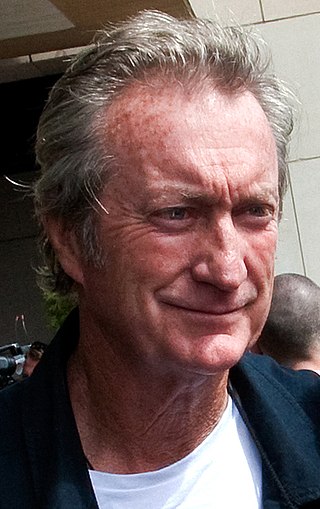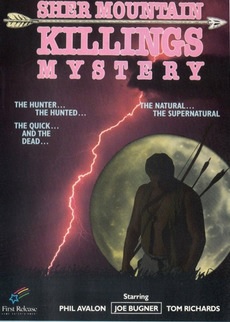Related Research Articles

Fabian Anthony Forte, professionally known as Fabian, is an American singer and actor.

John Hadley Thompson, AM is an Australian actor and a major figure of Australian cinema, particularly Australian New Wave. He is best known for his role as a lead actor in several acclaimed Australian films, including such classics as The Club (1980), Sunday Too Far Away (1975), The Man from Snowy River (1982) and Petersen (1974). He won Cannes and AFI acting awards for the latter film.

Bryan Neathway Brown AM is an Australian actor. He has performed in over eighty film and television projects since the late 1970s, both in his native Australia and abroad. Notable films include Breaker Morant (1980), Give My Regards to Broad Street (1984), F/X (1986), Tai-Pan (1986), Cocktail (1988), Gorillas in the Mist (1988), F/X2 (1991), Along Came Polly (2004), Australia (2008), Kill Me Three Times (2014) and Gods of Egypt (2016). He was nominated for a Golden Globe Award and an Emmy Award for his performance in the television miniseries The Thorn Birds (1983).
Byron Eric Kennedy was an Australian film producer known for co-creating the Mad Max series of films with George Miller.

Little Boy Lost is a 1978 Australian drama film starring Nathan Dawes as Stephen Walls, John Hargreaves as Jacko Walls, Lorna Lesley as Dorrie Walls, Tony Barry as Constable O'Dea and Steve Dodd as William Stanley, the Aboriginal tracker. The spelling of Steven Walls’s name was changed to “Stephen” in the movie.
Candida Raymond is an Australian actress of film and television during the 1970s and early 1980s.

Brian Medwin Trenchard-Smith is an English-Australian filmmaker and author, known for his idiosyncratic and satirical low-budget genre films. His filmography covers action, science fiction, martial arts, dystopian fiction, comedy, war, family, thriller, romance and erotica, and his works tend to be cross-genre pieces.
Antony I. Ginnane is an Australian film producer best known for his work in the exploitation field. He was head of the Screen Producers Association of Australia from 2008 to 2011. He has been described as "Australia's Roger Corman" or Australia's equivalent to Robert Lippert.

Terry Christopher Bourke was an Australian journalist, screenwriter, producer and director.
Igor Auzins is an Australian filmmaker. He joined Crawford Productions in 1969, worked as a cameraman, and then a director. He made documentaries for the South Australian Film Corporation, TV commercials, tele movies and features.
Raw Nerve is a 1990 Australian film directed by Tony Wellington and starring Rebecca Rigg, Kelly Dingwall, and John Polson. The plot concerns three teenagers who rob a house.
Breaking Loose is a 1988 Australian film. It was a sequel to Summer City (1977).

Sher Mountain Killings Mystery is a 1990 Australian film directed by Vince Martin and Phillip Avalon. This film is categorized as an "Ozploitation" horror film. The synopsis for this film is “Nobody trusted that the Gem has mysterious power. From thieves’ perspectives, it was just another jewel. But not everything is as it appears .’ The film differentiate itself from other horror film with the concepts such as Old Ranger’s castle, cursed stone and Mysterious power which adds more Australianness tone to the film.
Drums of Mer is a 1933 Australian novel by Ion Idriess set in the Torres Strait in present-day Queensland, Australia.
How Willingly You Sing is a 1975 low budget Australian feature film. It was shot over four weeks.
Ron McLean (1943–1983) was an Australian screenwriter, producer and executive producer, best known for his work on TV. He wrote most of the episodes for Spyforce, which he helped create. He had a long collaboration with producer Roger Mirams.
The Last Tasmanian is a 1978 documentary about the decline of Tasmania's Aboriginal people in the nineteenth century including through genocide by European colonists.
Graham Tardif is an Australian screen music composer. He is the composer on ten feature films directed and written by Rolf de Heer. Their most acclaimed collaboration, The Tracker (2002), resulted in an APRA-AGSC Screen Music Award for "Far Away Home" as Best Original Song Composed for a Feature Film, Telemovie, TV Series or Mini-Series in 2002. The Tracker also provided wins at Film Critics Circle of Australia Awards and IF Awards for the pair.
The 1988 Australian Film Institute Awards were awards held by the Australian Film Institute to celebrate the best of Australian films and television of 1988. Twenty six films were entered for the feature film categories.
Michael Cove is a British-Australian writer and journalist who has worked in film, television and theatre. He worked as a film editor in Britain before emigrating to Australia. He wrote a number of stage plays in the 1970s before working more in television.
References
- ↑ Scott Murray, "Fatal Bond", Cinema Papers, January 1993 p45
- ↑ Avalon p 63
- ↑ "Centrefold Phil turns a page". The Australian Women's Weekly . Vol. 43, no. 49. Australia. 5 May 1976. p. 48. Retrieved 4 August 2017– via National Library of Australia.
- ↑ Avalon p 19-23
- ↑ Avalon p 121
- ↑ "WHO'S DOING WHAT". Filmnews . Vol. 7, no. 3. New South Wales, Australia. 1 April 1977. p. 14. Retrieved 4 August 2017– via National Library of Australia.
- ↑ "AUSTRALIAN FILMS FOR THE HOLIDAY SEASON". Filmnews . Vol. 8, no. 1. New South Wales, Australia. 1 January 1978. p. 1. Retrieved 4 August 2017– via National Library of Australia.
- ↑ "IS LITTLE BOY LOST LOST?". Filmnews . Vol. 8, no. 6. New South Wales, Australia. 1 June 1978. p. 3. Retrieved 4 August 2017– via National Library of Australia.
- ↑ "Little Boy Lost may shy off the first-night glitter". The Australian Women's Weekly . Vol. 46, no. 23. Australia. 8 November 1978. p. 11. Retrieved 4 August 2017– via National Library of Australia.
- ↑ Avalon p 124